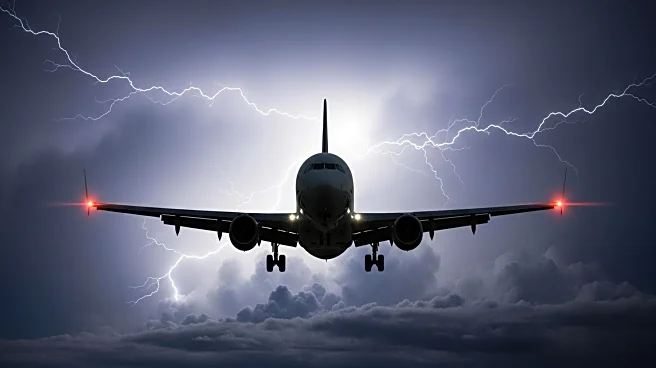What is the story about?
What's Happening?
A Ryanair flight from Pisa, Italy to Glasgow, Scotland was forced to make an emergency landing after nearly running out of fuel mid-flight. The incident occurred on October 3, when the crew issued a 'fuel mayday' as they realized the aircraft was dangerously low on fuel. The flight was further complicated by Storm Amy, which was causing severe turbulence and disrupting transportation across Scotland. The pilots attempted to land at Prestwick and Edinburgh airports but were unsuccessful due to the storm conditions. Eventually, the flight diverted to Manchester, landing safely with only 80 gallons of fuel remaining, enough for approximately 5-6 minutes of flight time. Aviation regulations require a minimum of 30 minutes of reserve fuel. Ryanair has reported the incident to authorities, and the Air Accidents Investigation Branch has commenced an investigation.
Why It's Important?
The incident highlights the critical importance of fuel management and emergency protocols in aviation. Running low on fuel poses significant risks, especially during adverse weather conditions, and can lead to catastrophic outcomes if not managed properly. The event underscores the need for stringent adherence to aviation safety standards and the importance of effective communication between flight crews and air traffic control. The investigation by the Air Accidents Investigation Branch will likely focus on the flight crew's fuel management practices and emergency response, which could lead to changes in industry regulations or training procedures to prevent similar occurrences in the future.
What's Next?
The ongoing investigation by the Air Accidents Investigation Branch will gather evidence and analyze the circumstances leading to the fuel shortage. Ryanair's cooperation with authorities may result in recommendations or changes to operational procedures. The incident may prompt airlines to review their fuel management strategies and emergency protocols, especially in challenging weather conditions. Stakeholders, including aviation regulators and industry experts, will be closely monitoring the investigation's findings to ensure passenger safety and prevent future incidents.
Beyond the Headlines
This event may lead to broader discussions on aviation safety standards and the role of technology in monitoring fuel levels and weather conditions. The integration of advanced systems for real-time fuel monitoring and predictive weather analysis could become a focus for airlines seeking to enhance safety measures. Additionally, the incident may influence public perception of air travel safety, potentially affecting consumer confidence and airline reputations.















